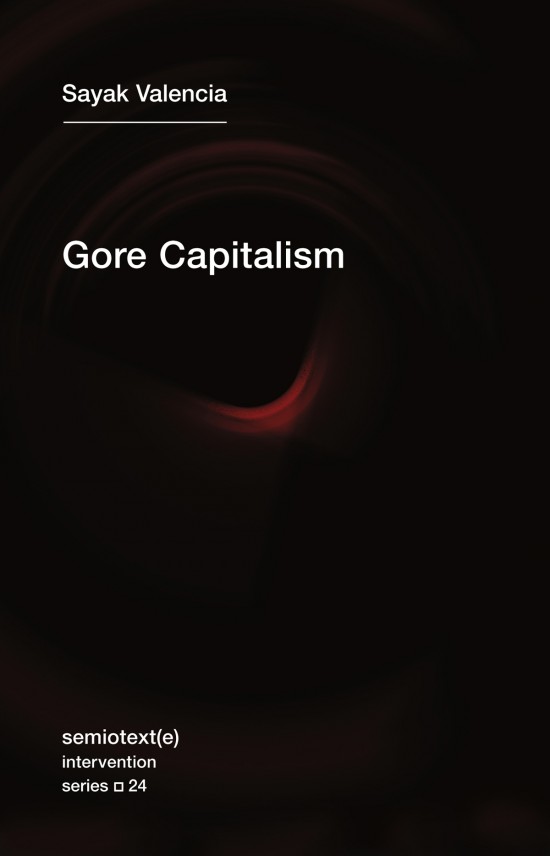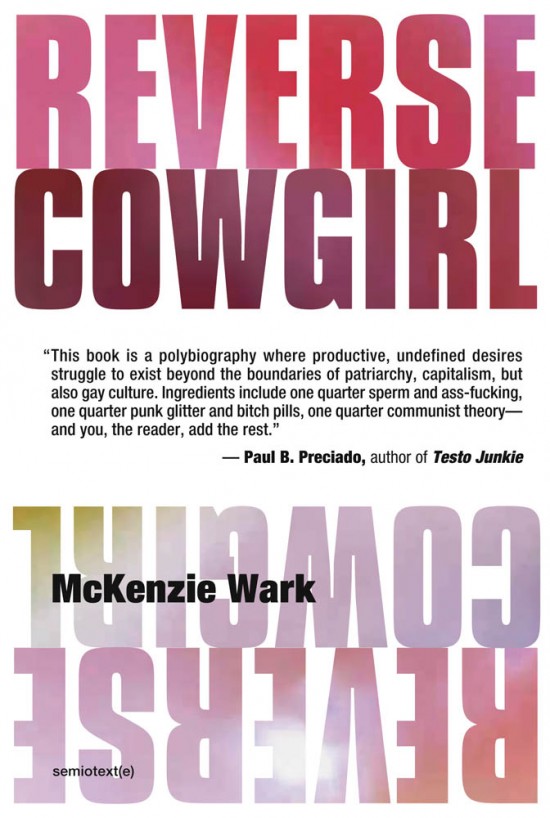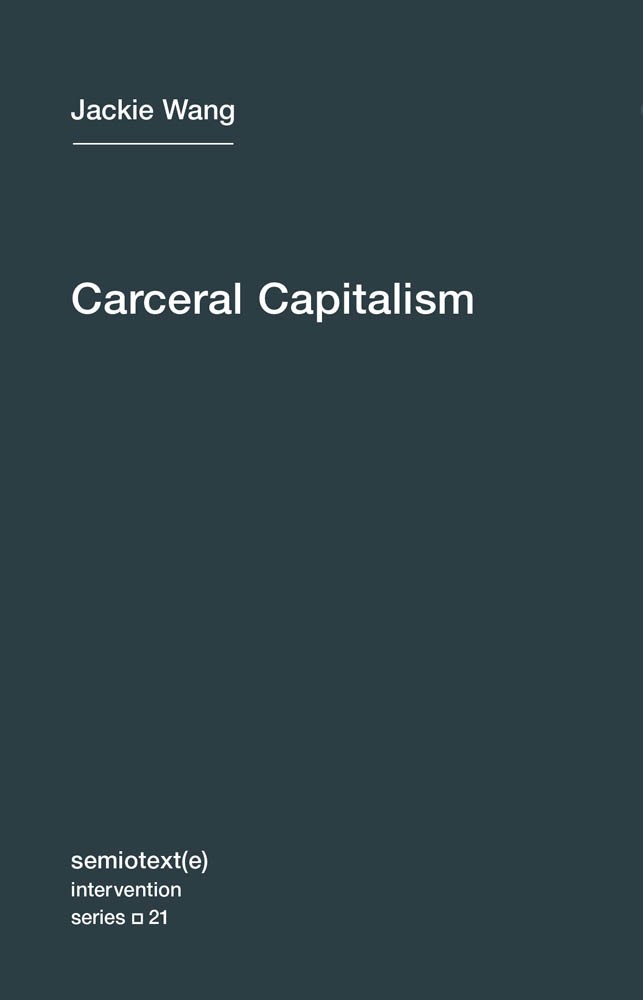Sayak Valencia: Gore Capitalism (2010–) [ES, EN]
Filed under book | Tags: · capitalism, death, feminism, necropolitics, neoliberalism, politics, violence

“Death has become the most profitable business in existence.”—from Gore Capitalism
“Written by the Tijuana activist intellectual Sayak Valencia, Gore Capitalism is a crucial essay that posits a decolonial, feminist philosophical approach to the outbreak of violence in Mexico and, more broadly, across the global regions of the Third World. Valencia argues that violence itself has become a product within hyper-consumerist neoliberal capitalism, and that tortured and mutilated bodies have become commodities to be traded and utilized for profit in an age of impunity and governmental austerity.
In a lucid and transgressive voice, Valencia unravels the workings of the politics of death in the context of contemporary networks of hyper-consumption, the ups and downs of capital markets, drug trafficking, narcopower, and the impunity of the neoliberal state. She looks at the global rise of authoritarian governments, the erosion of civil society, the increasing violence against women, the deterioration of human rights, and the transformation of certain cities and regions into depopulated, ghostly settings for war. She offers a trenchant critique of masculinity and gender constructions in Mexico, linking their misogynist force to the booming trade in violence.
This book is essential reading for anyone seeking to analyze the new landscapes of war. It provides novel categories that allow us to deconstruct what is happening, while proposing vital epistemological tools developed in the convulsive Third World border space of Tijuana.”
Publisher Melusina, Barcelona, 2010
ISBN 8496614875, 9788496614871
240 pages
English edition
Translated by John Pluecker
Publisher Semiotext(e), South Pasadena, CA, 2018
Intervention series
ISBN 9781635900125, 1635900123
330 pages
Reviews: Gabriela Wiener (El País, 2010, ES), Elisa G. McCausland (Profesiones, 2010, ES), Elena Cabrera (DT, 2011, ES), Sergio Gonzalez Rodriguez (Reforma, 2011, ES), Hilda Mariela Barbosa Suarez (Tribuna de Querétaro, 2011, ES), Ignacio Sánchez Prado (ARTMargins, 2018), Richard Marshall (3:AM Magazine, 2018), Rose Deller (LSE Review of Books, 2018), Abeyamí Ortega (Social Text, 2019), Anastasia Baginski (Chasquí, 2019).
Publisher (ES)
Distributor (EN)
Translator (EN)
WorldCat (EN)
Capitalismo gore (Spanish, 2010)
Gore Capitalism (English, 2018)
McKenzie Wark: Reverse Cowgirl (2020)
Filed under book, fiction | Tags: · auto-ethnography, criticism, gender, self, transgender

“Another genre for another gender.
What if you were trans and didn’t know it? What if there were some hole in your life and you didn’t even know it was there? What if you went through life not knowing why you only felt at home in your body at peak moments of drugs and sex? What if you expended your days avoiding an absence, a hole in being? Reverse Cowgirl is not exactly a memoir. The author doesn’t, in the end, have any answers as to who she really is or was, although maybe she figures out what she could become.
Traveling from Sydney in the 1980s to New York today, Reverse Cowgirl is a comedy of errors, chronicling the author’s failed attempts at being gay and at being straight across the shifting political and media landscapes of the late twentieth century. Finding that the established narratives of being transgender don’t seem to apply to her, Wark borrows from the genres of autofiction, fictocriticism, and new narrative to create a writing practice that can discover the form of a life outside existing accounts of trans experience: an auto-ethnography of the opacity of the self.”
Publisher Semiotext(e), South Pasadena, CA, 2020
Native Agents series
ISBN 9781635901184, 1635901189
199 pages
Reviews: J Inscoe (Rhizomes, 2020), Ondřej Trhoň (Revue Prostor, 2020, CZ).
Interviews with author: Mattilda Bernstein Sycamore (BOMB, 2020), Juliet Jacques (Frieze, 2020), Esmé Hogeveen (Hazlitt, 2020).
Comment (0)Jackie Wang: Carceral Capitalism (2018)
Filed under book | Tags: · algorithm, biopolitics, capitalism, governance, incarceration, race

“In this collection of essays, Jackie Wang examines the contemporary incarceration techniques that have emerged since the 1990s. The essays illustrate various aspects of the carceral continuum, including the biopolitics of juvenile delinquency, predatory policing, the political economy of fees and fines, cybernetic governance, and algorithmic policing. Included in this volume is Wang’s influential critique of liberal anti-racist politics, ‘Against Innocence,’ as well as essays on RoboCop, techno-policing, and the aesthetic problem of making invisible forms of power legible.
Wang shows that the new racial capitalism begins with parasitic governance and predatory lending that extends credit only to dispossess later. Predatory lending has a decidedly spatial character and exists in many forms, including subprime mortgage loans, student loans for sham for-profit colleges, car loans, rent-to-own scams, payday loans, and bail bond loans. Parasitic governance, Wang argues, operates through five primary techniques: financial states of exception, automation, extraction and looting, confinement, and gratuitous violence. While these techniques of governance often involve physical confinement and the state-sanctioned execution of black Americans, new carceral modes have blurred the distinction between the inside and outside of prison. As technologies of control are perfected, carcerality tends to bleed into society.”
Publisher Semiotext(e), South Pasadena, CA, 2018
Intervention series, 21
ISBN 9781635900026, 1635900026
359 pages
Interview with author (M. Buna, LA Review of Books, 2018)
Review: Steven Zultanski (Frieze, 2018).

